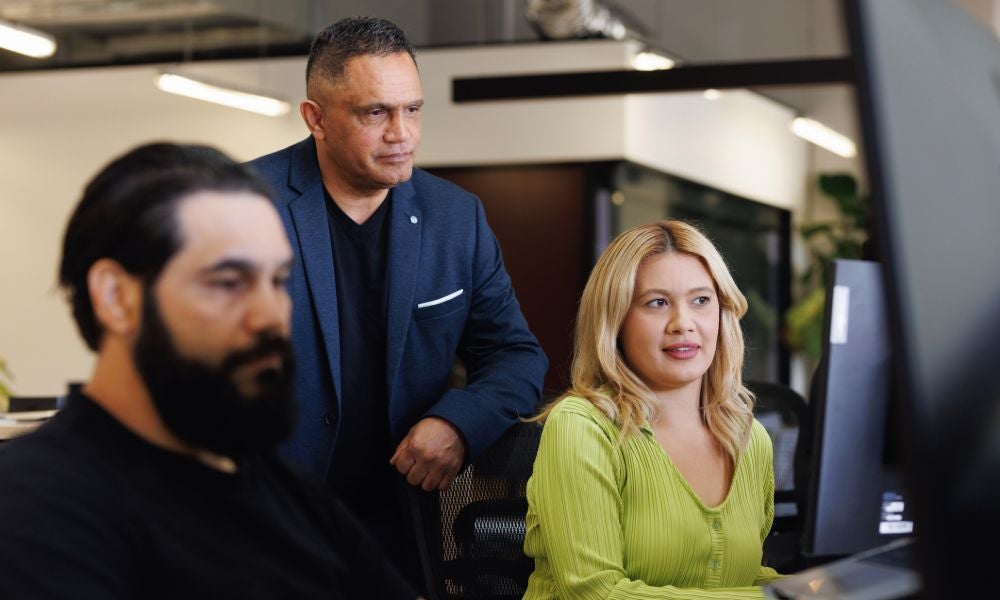How Dustin McClung drives Indigenous entrepreneurship
UNSW alumnus Dustin McClung discusses GADALI's mission to empower Indigenous Australians through technology, focusing on AI adoption and social impact initiatives
When Dustin McClung graduated from UNSW Sydney with a degree in electrical engineering in the mid-1990s, he could not have imagined that his career journey would lead him from telecommunications and music industry disruption to founding a purpose-driven technology consulting firm.
Today, as the founder of GADALI and its managing director, Mr McClung, a Ngunnawal man, focuses on bridging Aboriginal and Torres Strait Islander empowerment with cutting-edge technology and artificial intelligence.
Education and career foundations
Growing up in Camden, New South Wales (NSW), attending university was not a given for Mr McClung. But his time at UNSW Sydney profoundly shaped his trajectory, beginning with his undergraduate studies in electrical engineering.
“I feel very fortunate. Coming from a country town, we didn't have a lot of people who went to university back then,” he recalls. The campus became a home away from home, and lifelong friendships formed from those early days, significantly influencing his career path.
Learn more: Healing intergenerational trauma through meaningful work
“Electrical engineering or the engineering department in general was a great place to be. I still have a lot of good mates from there,” Mr McClung adds.
After graduating, Mr McClung briefly worked at Optus before moving to Sony Music, where, over a 25-year career, he witnessed firsthand the seismic shift from physical media to digital streaming. This experience marked a pivotal moment in his professional life. "Between 2000 and 2007, the global music industry revenues halved. That just annihilated everyone,” he says.
During this tumultuous period, Mr McClung pursued further education through UNSW's Master's in Business Technology (MBT), balancing a demanding career and young family responsibilities. “I did that when we started having our kids. My wife and I would tag-team it. I'd study through till about midnight, give the kids their last bottle feed, so it actually worked quite well,” he says.
He credits this degree with providing crucial skills in contract negotiation and leadership. Reflecting on influential lecturers, Mr McClung particularly notes the pragmatic approaches taught in his legal classes. “It saved us a lot of grief,” he says, explaining how these insights provided strategic advantages in corporate negotiations at Sony and beyond. “The MBT gave me the confidence to get to where I wanted to in my career,” he adds.

Founding GADALI: Bridging technology and Indigenous community
In 2023, Dustin McClung stepped away from his senior leadership role at Sony as Vice-President of Global Technologies ANZ, taking a career break to reflect on his future. In 2024, he founded GADALI, initially imagining it as a general ICT consulting firm. However, McClung soon recognised the critical importance of centering the company's identity around First Nations entrepreneurship.
He explains: “Having the Indigenous heritage, there weren't a lot of companies doing it from an IT perspective... we've got to build the human capital.” Recognising this critical need, Mr McClung designed a business model centred around partnerships and meaningful employment. “Our main mission is bolstering Indigenous representation in tech,” he says.
Mr McClung contrasts GADALI’s genuine intent with “black cladding,” a practice where businesses superficially claim Indigenous status by being 51% Indigenous-owned but allow the remaining 49% to be controlled by non-Indigenous entities. Such arrangements divert contracts intended for Indigenous quotas, ultimately benefiting external companies rather than Indigenous communities. Instead, he emphasises the importance of genuinely developing Indigenous capability in a transparent and meaningful way, ensuring clients clearly understand the company’s goals.
Subscribe to BusinessThink for the latest research, analysis and insights from UNSW Business School
GADALI's approach involves strategic partnerships where First Nations people gain vital skills through mentoring and practical experience. “If we can get a tender, we will find Indigenous employees who get on-the-job training. They’re GADALI employees, and we invest in them,” Mr McClung explains.
Specifically, his vision includes a franchise-like model to provide tech opportunities within rural Aboriginal communities in NSW and across Australia, allowing residents to remain close to their heritage and family networks. “I don't want to pull them out of the community and bring them into the city. We want regional jobs so they can stay in the community,” Mr McClung stresses.
AI adoption is central to GADALI’s mission. “Industry Studio”, which is a recent initiative by GADALI, accelerates AI adoption for businesses, offering rapid, tangible benefits rather than long-drawn consultancy processes. “We aim to resolve business problems through AI within four to eight weeks,” Mr McClung notes, underscoring the practical and fast-paced nature of his firm's services.
But GADALI's potential social impact goes beyond technology; McClung believes AI can tackle broader issues affecting First Nations Australians, such as incarceration rates and mortality. “Every dollar spent with an Indigenous business is worth $4.41 to the social economy,” Mr McClung says, illustrating the powerful multiplier effect of his work. He has also collaborated with global tech leaders like Microsoft to explore innovative AI solutions.

Inspiring the next generation of Indigenous entrepreneurs
Mr McClung is passionate about inspiring young First Nations people in Australia and New Zealand to pursue meaningful and impactful careers, frequently sharing his career advice through various podcasts and professional networks like LinkedIn. “Listen to everyone, especially your elders,” he advises. He emphasises the importance of integrity and moral clarity: “Stay true to your morals. It can be hard if your peer group disagrees, but question if you're in the right peer group.”
For aspiring entrepreneurs and co-founders of startups, Mr McClung highlights continuous learning, proactive networking, and thorough research as keys to success. “Always do something. Sitting around doing nothing doesn't teach you anything,” he says. Encouraging proactive behaviour, McClung recommends leveraging resources provided by the NSW Government, including Indigenous procurement policies and events like NAIDOC Week, to build essential networks.
In addition, he mentions contrition and humility as being the two most important characteristics for success. These values aren't just theoretical for hi – they're principles he actively teaches his own family. “Two words I say to my kids that you need to follow: contrition and humility – always be responsible and respectful for what you're doing, and if you do something wrong, own up to it and be remorseful and try and change it,” he says.
Learn more: The path towards Indigenous economic empowerment
Looking ahead, Mr McClung envisions expanding GADALI’s impact significantly over the next decade, aiming to implement innovative projects like AI-assisted language preservation, ensuring Aboriginal and Torres Strait Islander languages endure for future generations. “Languages are increasingly disappearing. AI can help preserve them, ensuring these languages survive for future generations,” Mr McClung says.
His most ambitious career goal? Making meaningful progress toward the Closing the Gap targets, particularly in education and employment, by using technology to help Indigenous communities navigate bureaucratic challenges that contribute to inequality. “If we can streamline these processes, we can impact incarceration and mortality rates, because people don't know where to go,” he says.
